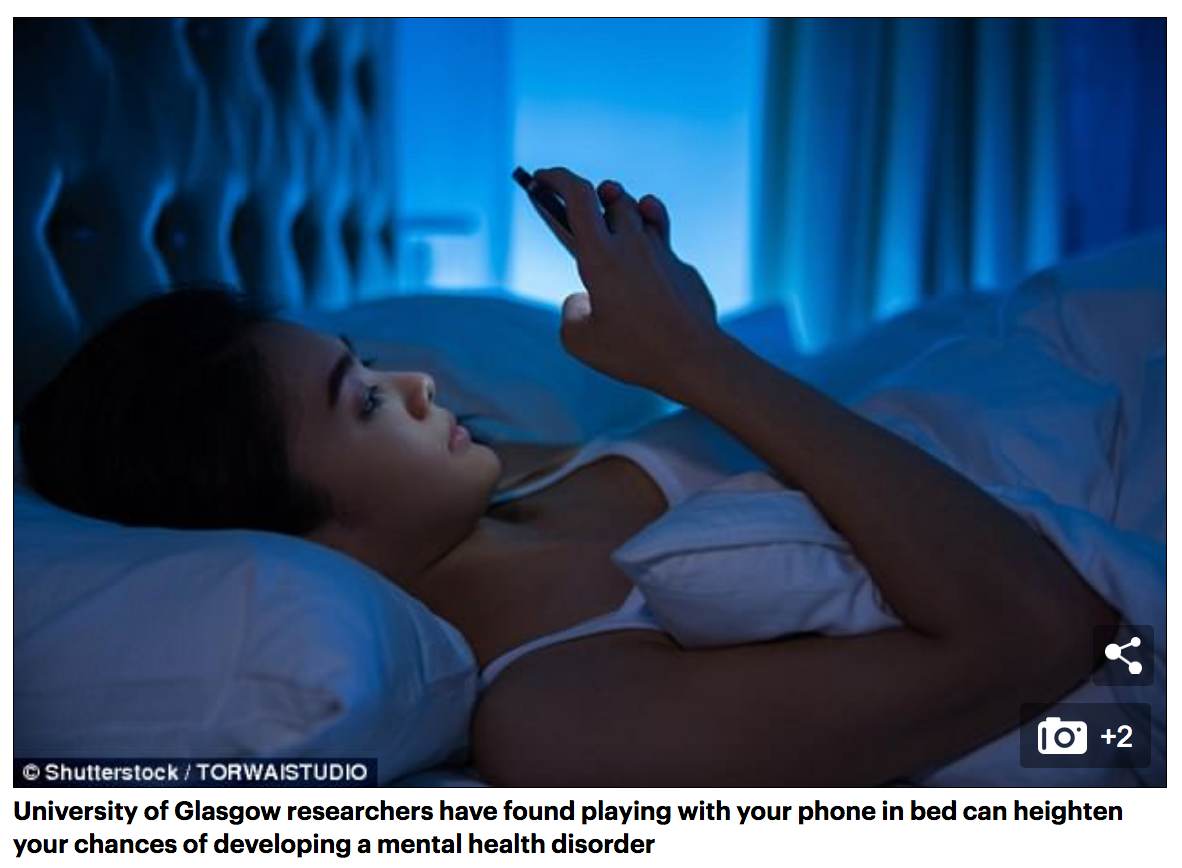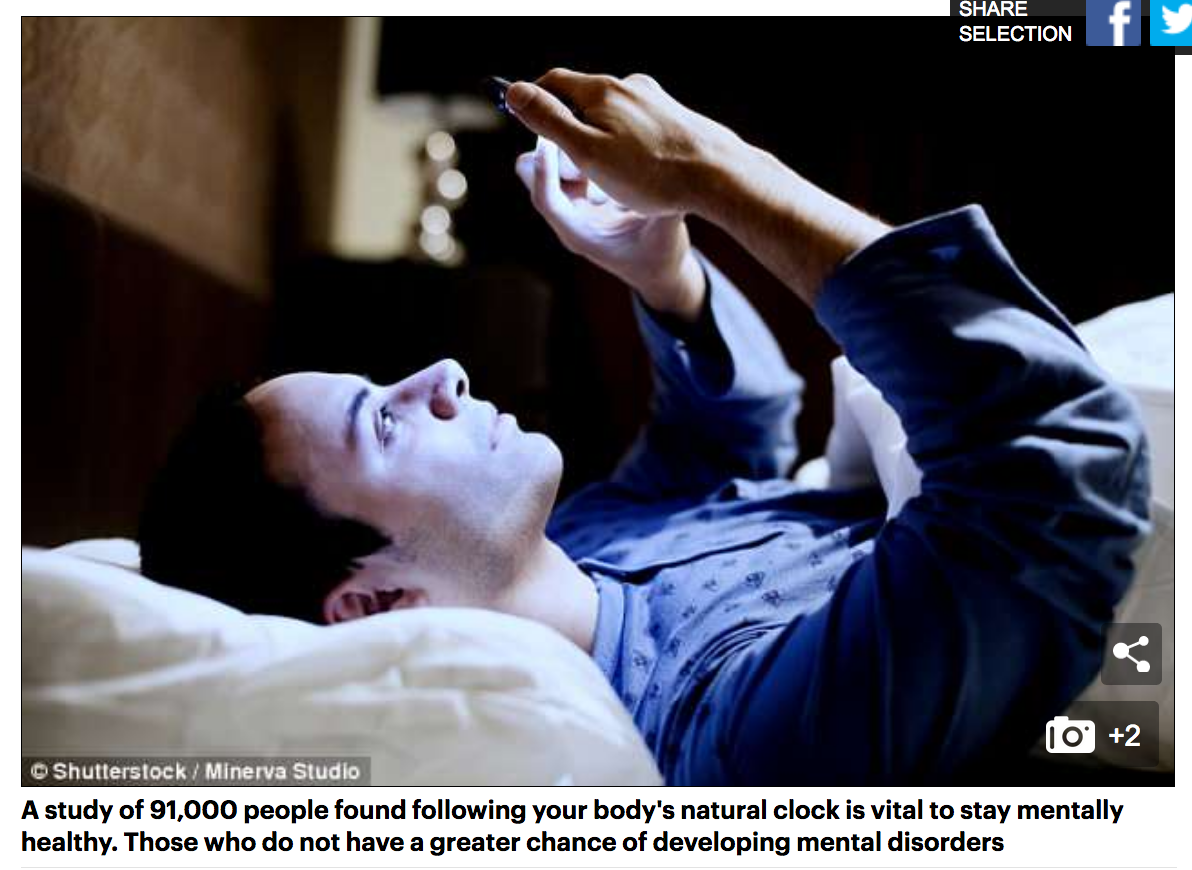
This email just in from Lloyd Burrell at www.electricsense.com. Full article below.
Switch off mobiles at 10pm to prevent mood disorders’ – reports yesterdays edition of The Times.
The findings come from the largest study of its kind, involving more than 91,000 people across the UK.
The study, carried out by a research team at the University of Glasgow, found playing with your phone in bed can heighten your chances of developing a mental health disorder.
The researchers also found that:
– people who fail to follow their natural body clock rhythm are more likely to have depression and mental health problems.
– people work on a 24-hour sleep/wake cycle have a greater susceptibility to mood disorders.
– those who are inactive during the day and more active or restless at night have an increased risk of depression, bipolar disorder and low mood.
Professor Daniel Smith, professor of psychiatry at the university, said, ‘You can… turn off your mobile phone around 10pm because the light in it is telling your brain it’s daytime.’
He went on to comment, ‘this is an important study demonstrating a robust association between disrupted circadian rhythm and mood disorders’.
The health effects of not following a natural cycle have been known about for a long time. They have previously been associated with an increased risk of cancer, heart disease and obesity.
Light at night is considered so dangerous by the IARC (International Agency for Research on Cancer) that it has classified light at night as a class 2A carcinogen.
But what’s interesting here is that:
– we have a major study linking cell phone use with mental health disorders
– it’s making front page news (printed edition) in The Times, no less.
For those of you that don’t know, The Times, published in London, is one of the oldest and most influential newspapers in the UK and considered by some as one of the world’s greatest newspapers (say’s he with a hint of pride!).
What’s a pity is that the article doesn’t mention the health impact of electromagnetic fields.
Because this is where the real danger lies.
EMF exposures at night are a big deal.
Studies show EMFs exposures can interrupt sleep cycles and they are linked to a host of ailments and symptoms like: irritation of allergies, tiredness upon awakening, heart palpitations, muscle pain and weakness, and daytime irritability as well as generally weakening your immune system.
When I was experiencing electrical hyper sensitivity symptoms a few years ago, I remember it feeling like someone had turned up the volume switch. As night descended and I’d be working on my computer (all wired as well) my hot head and prickly skin symptoms would take on a life of their own.
Lloyd Burrell
ElectricSense
Live a naturally healthy life in our electromagnetic world!
Source Article:
Turn your phone off after 10pm to stay happy! Late-night phone use is linked to poor sleep and moodiness because the light tells your brain it's daytime
http://www.dailymail.co.uk/news/article-5733765/Turn-phone-10pm-avoid-risk-mental-health-problems.html
– Using your phone at night sends false signals to your brain, a study has found
– Disruption to your body clock can heighten the risk of mental health problems
– A study involving 91,000 people has found sleep disruption causes depression
Turn your phone off after 10pm to stay happy! Late-night phone use is linked to poor sleep and moodiness because the light tells your brain it’s daytime
People who fail to follow their natural body clock rhythm are more likely to have depression and mental health problems, a study has found.
Those who are inactive during the day and more active or restless at night have an increased risk of depression, bipolar disorder and low mood.
The findings come from the largest study of its kind, involving more than 91,000 people across the UK.
It was carried out by University of Glasgow researchers, who say disruption to normal circadian rhythms, which work on a 24-hour sleep/wake cycle, is associated with a greater susceptibility to mood disorders.
Those who took part had their activity levels monitored over a week.

Professor Daniel Smith, professor of psychiatry at the university, said: ‘A healthy rhythm is to be quite active during the day and very inactive at night.
‘This is an important study demonstrating a robust association between disrupted circadian rhythm and mood disorders.’
The study found those who did not follow the natural cycle were more likely to have mood disorders such as severe depression and bipolar disorder.
They were also more likely to feel lonely and less happy.
Professor Smith added: ‘There are a lot of things people can do, especially during the winter, such as getting out of the house in the morning to get exposed to light and take exercise, so that by evening they are tired.
‘You can also turn off your mobile phone around 10pm because the light in it is telling your brain it’s daytime. But it is hard for some people, such as shift workers, because of their job or because of their family circumstances.’
It is already known that the internal body clock regulates many functions including body temperature and eating habits.
Long-term night-shift work has previously been associated with an increased risk of cancer, heart disease and obesity.
However, the researchers say it is still not certain whether an out-of-kilter body clock causes mental health problems, or if the mental health problems are causing disturbances to people’s daytime and night-time cycles. They plan to investigate this next.
The researchers analysed activity data in 91,105 participants aged 37-73 from the UK Biobank, a large study group taken from the general population.

The researchers found that those who did not follow the natural rhythm had a greater likelihood of major depression or bipolar disorder and were also more likely to suffer worse wellbeing such as lower happiness levels.
Writing in journal The Lancet Psychiatry, Dr Aiden Doherty, senior research fellow from the University of Oxford’s Nuffield Department of Population Health, said a next step could be to carry out further research on younger people.
He added: ‘The circadian system undergoes developmental changes during adolescence, which is also a common time for the onset of mood disorders.
‘It might be that the UK Biobank provides the impetus for a resource of a similar scale in adolescents and younger adults to help transform our understanding of the causes and consequences, prevention and treatment of mental health disorders.’



